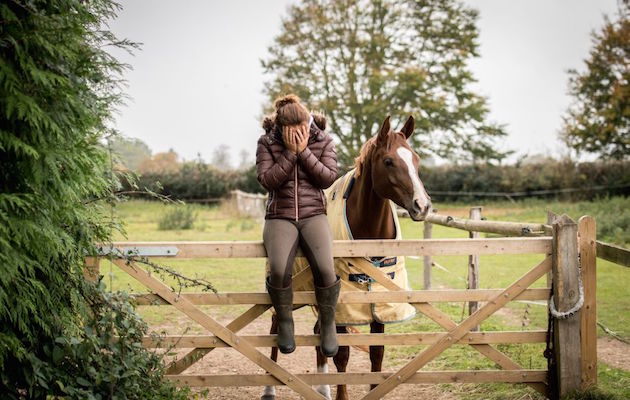Awareness around mental health in sport is growing, and some dressage riders are among those suffering. Polly Bryan investigates whether there is a mental health crisis brewing within our world, and what can be done
MORE dressage riders than ever are speaking out about their experiences of mental health. While increased awareness can only be positive, the reality is that poor mental health, and its often devastating consequences, is worryingly widespread. It’s time to ask: can dressage incite psychological suffering in a way that differs to the other equestrian disciplines, and what can we do about it?
Five-time Olympian Carl Hester is one of many big names to have publicly promoted the importance of good mental health in recent years.
“I don’t necessarily think the situation in dressage is worse than in other disciplines, but dressage is so particular that its participants tend to attract more criticism, very often from the people inside the sport,” he says. “I think most of us would say that we have been negatively criticised – I am at the stage in my career where I am confident in what I do, but it doesn’t stop people questioning what I do.”
{"content":"PHA+SW50ZXJuYXRpb25hbCBncmFuZCBwcml4IHJpZGVyIGFuZCB0cmFpbmVyIDxhIGhyZWY9Imh0dHBzOi8vd3d3LmhvcnNlYW5kaG91bmQuY28udWsvdGFnL2FubmEtcm9zcyIgdGFyZ2V0PSJfYmxhbmsiIHJlbD0ibm9vcGVuZXIgbm9yZWZlcnJlciI+QW5uYSBSb3NzPC9hPiBhZ3JlZXMgdGhhdCB0aGUgZmFjdCBkcmVzc2FnZSBieSBpdHMgdmVyeSBuYXR1cmUgaXMgYSDigJxqdWRnZWTigJ0gc3BvcnQsIGFuZCBhdHRyYWN0cyBtYW55IHJpZGVycyB3aXRoIHBlcmZlY3Rpb25pc3QgdGVuZGVuY2llcywgY2FuIGxlYWQgdG8gbWVudGFsIGhlYWx0aCBzdHJ1Z2dsZXMuPC9wPgo8cD7igJxIYXZpbmcgYSBwZXJmZWN0aW9uaXN0IG1lbnRhbGl0eSBpbiBhIHN1YmplY3RpdmUgc3BvcnQgaXMgYSBkaWZmaWN1bHQgY29tYmluYXRpb24gdG8gaGFuZGxlLOKAnSBzaGUgc2F5cy4g4oCcQmxlbmRpbmcgcGVyZmVjdGlvbmlzbSB3aXRoIHRyeWluZyB0byBhY2hpZXZlIHNvbWV0aGluZyB0aGF0IG5vIG9uZSBoYXMgeWV0IHBlcmZlY3RlZCwgYW5kIHRoZW4gYWRkaW5nIGFuIGFuaW1hbCB3aXRoIGl0cyBvd24gZnJlZSB3aWxsIGludG8gdGhlIG1peCDigJMgaXTigJlzIG5vdCBlYXN5LjwvcD4KPHA+PGRpdiBjbGFzcz0iYWQtY29udGFpbmVyIGFkLWNvbnRhaW5lci0tbW9iaWxlIj48ZGl2IGlkPSJwb3N0LWlubGluZS0yIiBjbGFzcz0iaXBjLWFkdmVydCI+PC9kaXY+PC9kaXY+PHNlY3Rpb24gaWQ9ImVtYmVkX2NvZGUtMzEiIGNsYXNzPSJoaWRkZW4tbWQgaGlkZGVuLWxnIHMtY29udGFpbmVyIHN0aWNreS1hbmNob3IgaGlkZS13aWRnZXQtdGl0bGUgd2lkZ2V0X2VtYmVkX2NvZGUgcHJlbWl1bV9pbmxpbmVfMiI+PHNlY3Rpb24gY2xhc3M9InMtY29udGFpbmVyIGxpc3RpbmctLXNpbmdsZSBsaXN0aW5nLS1zaW5nbGUtc2hhcmV0aHJvdWdoIGltYWdlLWFzcGVjdC1sYW5kc2NhcGUgZGVmYXVsdCBzaGFyZXRocm91Z2gtYWQgc2hhcmV0aHJvdWdoLWFkLWhpZGRlbiI+DQogIDxkaXYgY2xhc3M9InMtY29udGFpbmVyX19pbm5lciI+DQogICAgPHVsPg0KICAgICAgPGxpIGlkPSJuYXRpdmUtY29udGVudC1tb2JpbGUiIGNsYXNzPSJsaXN0aW5nLWl0ZW0iPg0KICAgICAgPC9saT4NCiAgICA8L3VsPg0KICA8L2Rpdj4NCjwvc2VjdGlvbj48L3NlY3Rpb24+PC9wPgo8cD7igJxZb3VyIGlkZWEgb2YgcGVyZmVjdGlvbiBtYXkgbm90IGJlIHRoZSBzYW1lIGFzIHRoZSBuZXh0IHBlcnNvbuKAmXMuIEl0IG5lZWRzIHRvIGJlIGZpcm1seSB1bmRlcnN0b29kIHRoYXQgd2hpbGUgd2UgYWxsIHdvcmsgdG8gdGhlIHNhbWUgc2V0IG9mIGNyaXRlcmlhLCBldmVyeWJvZHkgd2lsbCBoYXZlIGEgc2xpZ2h0bHkgZGlmZmVyZW50IHdheSBvZiBpbnRlcnByZXRpbmcgdGhhdDsgZm9yIGV4YW1wbGUsIGp1ZGdpbmcgdGhlIGJhbGFuY2UgYmV0d2VlbiBleHByZXNzaW9uIGFuZCB0ZW5zaW9uIGluIGEgbW92ZW1lbnQu4oCdPC9wPgo8cD5NZW50YWwgaGVhbHRoIGNvYWNoIGFuZCByaWRlciBTeWx2aWEgQnJ1Y2UgaGFzIHdvcmtlZCBleHRlbnNpdmVseSB3aXRoIFJpZGVycyBNaW5kcywgdGhlIG9ubGluZSByZXNvdXJjZSBsYXVuY2hlZCBpbiBlYXJseSAyMDIwIGJ5IHRoZSBsYXRlIGV2ZW50ZXIgYW5kIG1lbnRhbCBoZWFsdGggY2FtcGFpZ25lciA8YSBocmVmPSJodHRwczovL3d3dy5ob3JzZWFuZGhvdW5kLmNvLnVrL3RhZy9tYXR0aGV3LXdyaWdodCIgdGFyZ2V0PSJfYmxhbmsiIHJlbD0ibm9vcGVuZXIgbm9yZWZlcnJlciI+TWF0dGhldyBXcmlnaHQ8L2E+IGFuZCBoaXMgd2lmZSBWaWN0b3JpYS4gU3lsdmlhIGV4cGxhaW5zIHRoYXQgc2hlIGhhcyB3aXRuZXNzZWQgZGlmZmVyaW5nIGN1bHR1cmVzIGFjcm9zcyB0aGUgZXF1ZXN0cmlhbiBzcG9ydHMgdGhhdCBjb250cmlidXRlIHRvIHJpZGVyc+KAmSBleHBlcmllbmNlcywgYW5kIHRoYXQgaXQgY2FuIGJlIGhhcmQgdG8gZGV0YWNoIHlvdXJzZWxmIGZyb20gdGhlIGluZXZpdGFibGUganVkZ2VtZW50IHRoYXQgZHJlc3NhZ2UgZGVtYW5kcy48L3A+CjxwPuKAnFdoZW4gaXQgaXMgeW91ciBwZXJmb3JtYW5jZSBiZWluZyBqdWRnZWQgYnkgYW5vdGhlciBwZXJzb24g4oCTIGFzIG9wcG9zZWQgdG8gYSBzaG93anVtcGluZyBmZW5jZSBiZWluZyB1cCBvciBkb3duIOKAkyBpdCBhbGwgY29tZXMgZG93biB0byBwZXJjZXB0aW9uIGFuZCBvcGluaW9uLiBCdXQgaXTigJlzIGltcG9ydGFudCB0byBzZXBhcmF0ZSB0aGUgcGVyc29uIGZyb20gdGhlIHBlcmZvcm1hbmNlOyBpdCBpcyB0aGUgcGVyZm9ybWFuY2UgdGhhdCBpcyBiZWluZyBqdWRnZWQsIG5vdCB0aGUgcmlkZXIg4oCTIHRoZSBwZXJzb24g4oCTIHRoZW1zZWx2ZXMs4oCdIHNoZSBzYXlzLjwvcD4KPGRpdiBjbGFzcz0iYWQtY29udGFpbmVyIGFkLWNvbnRhaW5lci0tbW9iaWxlIj48ZGl2IGlkPSJwb3N0LWlubGluZS0zIiBjbGFzcz0iaXBjLWFkdmVydCI+PC9kaXY+PC9kaXY+CjxwPuKAnE1lbnRhbCBoZWFsdGggaXMgYSBjb250aW51dW06IHBvc2l0aXZlIGF0IG9uZSBlbmQgYW5kIHBvb3IgYXQgdGhlIG90aGVyLOKAnSBzaGUgYWRkcy4g4oCcTWVudGFsIGhlYWx0aCBpbnZvbHZlcyBhbGwgc29ydHMgb2Ygc2tpbGxzIHdlIG5lZWQsIGxpa2UgZGVjaXNpb24tbWFraW5nIGFuZCB0aGUgYWJpbGl0eSB0byBsZWFybiwgYW5kIGNhbiBiZSBmYW50YXN0aWMgd2hlbiBhcHBsaWVkIHBvc2l0aXZlbHkuIEJ1dCBkcmVzc2FnZSBzZWVtcyB0byBkZW1hbmQgdGhhdCBkcml2ZSBmb3IgcGVyZmVjdGlvbiwgdGhhdCBwZXJmZWN0IDEwLCB3aGVuIGl0IGNhbiBmZWVsIGFzIHRob3VnaCBhbnl0aGluZyBlbHNlIGlzIG5vdCBnb29kIGVub3VnaC4gT3ZlciB0aW1lLCB0aGF0IGNhbiBuaWJibGUgYXdheSBhdCBhIHBlcnNvbuKAmXMgcHN5Y2hlLuKAnTwvcD4KPHA+TVVDSCBvZiB0aGUgY3VycmVudCBzaXR1YXRpb24gc3Vycm91bmRpbmcgbWVudGFsIGhlYWx0aCBjYW4gYmUgYXR0cmlidXRlZCB0byBzb2NpYWwgbWVkaWEg4oCTIGJvdGggaW4gc3ByZWFkaW5nIGF3YXJlbmVzcyBhbmQgYWdncmF2YXRpbmcgcmlkZXJz4oCZIHN0cnVnZ2xlcy48L3A+CjxkaXYgY2xhc3M9ImFkLWNvbnRhaW5lciBhZC1jb250YWluZXItLW1vYmlsZSI+PGRpdiBpZD0icG9zdC1pbmxpbmUtNCIgY2xhc3M9ImlwYy1hZHZlcnQiPjwvZGl2PjwvZGl2Pgo8cD7igJxTb2NpYWwgbWVkaWEgZ2l2ZXMgZXZlcnlvbmUgYW4gaW5zdGFudCB2b2ljZSwgd2hpY2ggYWRkcyBlbm9ybW91cyBwcmVzc3VyZSzigJ0gc2F5cyBBbm5hLiDigJxTb21lb25lIGNhbiBoYXZlIGEgcGhvdG8gdXAgb25saW5lIG9mIHlvdSBiZWZvcmUgeW91IGhhdmUgZXZlbiBmaW5pc2hlZCB5b3VyIHRlc3QsIGFuZCBhbnlvbmUgY2FuIHNheSBhbnl0aGluZyBhYm91dCBpdC4gVGhlc2UgbW9tZW50cyBpbiB0aW1lLCB3aGljaCBpcyB3aGF0IHBob3RvcyBhcmUsIGJ1eSBpbnRvIHRoZSBkcmVzc2FnZSBtZW50YWxpdHkgb2YgZXhhbWluaW5nIHRoZSBtaW51dGlhZSwgYW5kIHRoZXJlIGFyZSBlbW90aXZlIHN1YmplY3RzIG9uIHRoZSBwbGF0ZSBoZXJlLCBsaWtlIGFuaW1hbCB3ZWxmYXJlLuKAnTwvcD4KPHA+4oCcVGhpbmdzIGNhbiBlc2NhbGF0ZSBzbyBlYXNpbHkgb24gc29jaWFsIG1lZGlhLOKAnSBhZ3JlZXMgQ2FybCwgd2hvIHNheXMgaGUgY291bnRzIGhpbXNlbGYgbHVja3kgdG8gaGF2ZSBncm93biB1cCB3aXRob3V0IGl0LCBhbmQgdGhhdCBoZSB3b3JyaWVzIGFib3V0IHlvdW5nZXIgcmlkZXJzIGdpdmluZyB1cCB0aGUgc3BvcnQgb3V0IG9mIHdvcnJ5IGFyb3VuZCB3aGF0IG90aGVycyBtaWdodCBzYXkgYWJvdXQgdGhlbSBvbmxpbmUuPC9wPgo8ZGl2IGNsYXNzPSJhZC1jb250YWluZXIgYWQtY29udGFpbmVyLS1tb2JpbGUiPjxkaXYgaWQ9InBvc3QtaW5saW5lLTUiIGNsYXNzPSJpcGMtYWR2ZXJ0Ij48L2Rpdj48L2Rpdj4KPHA+T2xpdmlhIFRvd2VycyBpcyBhIGdyYW5kIHByaXggcmlkZXIgYW5kIHZsb2dnZXIgd2hvIGhhcyBzdHJ1Z2dsZWQgd2l0aCBzZXZlcmUgYW54aWV0eSBmb3IgbXVjaCBvZiBoZXIgbGlmZS4gU2hlIGV4cGxhaW5zIHRoYXQgaGVyIHBlcmZlY3Rpb25pc3QgbmF0dXJlIGJlY2FtZSBkYW1hZ2luZyB3aGVuIGl0IGxlZCB0byBpbnRlbnNlIHNlbGYtZG91YnQsIGFuZCB0aGF0IHNvY2lhbCBtZWRpYSBvZnRlbiBjb250cmlidXRlcyB0byB0aGVzZSBmZWVsaW5ncyBpbiByaWRlcnMuPC9wPgo8cD7igJxUaGVyZSBpcyBtYXNzaXZlIHByZXNzdXJlIG9uIHJpZGVycyBmb3IgZXZlcnl0aGluZyB0byBsb29rIHBlcmZlY3QsIGJ1dCB0aGUgcmVhbGl0eSBvZiB0cmFpbmluZyBob3JzZXMgaXMgdGhhdCBpdCBkb2VzbuKAmXQgbG9vayBsaWtlIHRoYXQgYWxsIHRoZSB0aW1lLiBJdOKAmXMgYSBtZXNzeSBwcm9jZXNzIGFuZCBob3JzZXMgZG9u4oCZdCBmZWVkIHdlbGwgb2ZmIHBlcmZlY3Rpb25pc20uIEJ1dCBJIGhhdmUgYmVlbiByaWRpY3VsZWQgZm9yIHRyeWluZyB0byBzaG93IHJlYWxpdHkgb24gc29jaWFsIG1lZGlhLuKAnTwvcD4KPHA+V2hpbGUgZ3JhdGVmdWwgZm9yIHRoZSBpbmNyZWFzZWQgYXdhcmVuZXNzIG9mIG1lbnRhbCBoZWFsdGggdGhhdCBzb2NpYWwgbWVkaWEgaGFzIGhlbHBlZCB0byBicmluZyBhYm91dCwgT2xpdmlhIGlzIGFsc28gY2F1dGlvdXMgb2YgaXNzdWVzIGJlY29taW5nIG92ZXJseSBub3JtYWxpc2VkLjwvcD4KPHA+4oCcSXTigJlzIGdyZWF0IHRoYXQgd2UgYXJlIGFsbCBtb3JlIGF3YXJlIG9mIG1lbnRhbCBoZWFsdGggbm93OyB3aGVuIEkgZmlyc3Qgc3RhcnRlZCB0YWxraW5nIGFib3V0IHRoaXMgb25saW5lLCBJIGZlbHQgY29tcGxldGVseSBhbG9uZSBpbiB0aGUgZHJlc3NhZ2Ugd29ybGQsIGFuZCBkaWRu4oCZdCB0aGluayBhbnlvbmUgZWxzZSBmZWx0IHRoZSBzYW1lIHdheSBhcyBtZSzigJ0gc2hlIHNheXMuIOKAnEJ1dCB3ZSBoYXZlIHRvIGJlIGNhcmVmdWwgcGVvcGxlIGRvbuKAmXQgc3RhcnQgdG8gbGFiZWwgdGhlbXNlbHZlcyBbYXMgaGF2aW5nIGEgbWVudGFsIGhlYWx0aCBwcm9ibGVtXSwgd2hlbiB0aGV5IGFyZSBleHBlcmllbmNpbmcgYSBub3JtYWwgaHVtYW4gZW1vdGlvbiwgbGlrZSBhbnhpZXR5IGluIGEgY2VydGFpbiBzaXR1YXRpb24uIEl04oCZcyBpbXBvcnRhbnQgdG8gcmV0YWluIHBlcnNwZWN0aXZlIGFuZCByZWNvZ25pc2Ugd2hlbiB0aGVzZSBmZWVsaW5ncyBzdGFydCB0byBoYXBwZW4gYWxsIHRoZSB0aW1lLCBvciBnZXQgb3V0IG9mIGNvbnRyb2wu4oCdPC9wPgo8cD5TeWx2aWEgaXMgYWxzbyBrZWVuIHRvIHBvaW50IG91dCB0aGF0IGl0IGlzIGltcG9ydGFudCB0byBkaWZmZXJlbnRpYXRlIGJldHdlZW4gZXhwZXJpZW5jaW5nIG9jY2FzaW9ucyB3aGVuIG91ciBtZW50YWwgaGVhbHRoIGlzIG5vdCB3aGVyZSB3ZeKAmWQgbGlrZSBpdCB0byBiZSwgd2hpY2ggaXMgbm9ybWFsLCBhbmQgc2lnbnMgb2YgYSBtZW50YWwgaWxsbmVzcywgc3VjaCBhcyBkZXByZXNzaW9uLjwvcD4KPHA+4oCcV2UgYWxsIGhhdmUgYmFkIGRheXMsIGJ1dCB0aGVzZSBjYW4gdGlwIGludG8gc29tZXRoaW5nIG1vcmUgYW5kIGl04oCZcyBpbXBvcnRhbnQgdG8gYmUgaG9uZXN0IHdpdGggeW91cnNlbGYgaWYgdGhpcyBpcyB0aGUgY2FzZSwgdG8gYXNrIHlvdXJzZWxmIGhvdyBsb25nIHRoZSBiYWQgZGF5cyBoYXZlIGJlZW4gZ29pbmcgb24gZm9yLCBhbmQgaW1wb3J0YW50bHksIHdoYXQgdG8gZG8gYWJvdXQgaXQs4oCdIHNoZSBzYXlzLjwvcD4KPHA+RVZFTiB3aGVuIHNvY2lhbCBtZWRpYSBpcyBub3QgYSBkaXJlY3QgY2F1c2Ugb2YgcG9vciBtZW50YWwgaGVhbHRoLCBpdHMg4oCcc2hvcCB3aW5kb3figJ0gZnVuY3Rpb24gcHJlc2VudHMgYSBjb21wbGV4IGNoYWxsZW5nZSB3aGVuIGl0IGNvbWVzIHRvIHJ1bm5pbmcgYSBidXNpbmVzcyBvciBzaW1wbHkgcHJlc2VudGluZyB5b3Vyc2VsZiB0byB0aGUgd29ybGQgYXMgYSBwcm9mZXNzaW9uYWwuPC9wPgo8cD7igJxJdOKAmXMgaW1wb3J0YW50IHRvIHJlYWNoIG91dCBpZiB5b3XigJlyZSBzdHJ1Z2dsaW5nLCBidXQgaXTigJlzIGFsc28gaW1wb3J0YW50IHRvIGNvbnNpZGVyIGhvdyBhbmQgd2h5LOKAnSBwb2ludHMgb3V0IEFubmEuIOKAnE15IGFkdmljZSB3b3VsZCBiZSB0byB0ZWxsIGEgdHJ1c3RlZCBmcmllbmQgb3IgZmFtaWx5IG1lbWJlciwgb3Igc3BlYWsgdG8gYSBtZW50YWwgaGVhbHRoIHByb2Zlc3Npb25hbCwgYnV0IHRvIGJlIGNhcmVmdWwgd2hhdCB5b3UgYWlyIG9uIHB1YmxpYyBzb2NpYWwgbWVkaWEgcGxhdGZvcm1zIGxpa2UgeW91ciBidXNpbmVzcyBGYWNlYm9vayBwYWdlIOKAkyBlc3BlY2lhbGx5IGlmIHlvdSB3YW50IHNvbWVib2R5IHRvIGJvb2sgYSBsZXNzb24gd2l0aCB5b3UgdGhlIG5leHQgbW9ybmluZy7igJ08L3A+CjxwPkZvciBBbm5hLCB0aGUgZ3JvdXAgbW9zdCBhdCByaXNrIG9mIGhhdmluZyB0aGVpciBtZW50YWwgd2VsbGJlaW5nIGNvbXByb21pc2VkIGJ5IHRoZSBwcmVzc3VyZXMgb2YgdGhlIHNwb3J0IGFyZSB5b3VuZ2VyIGFkdWx0cywgd2hvIGhhdmUgZ3JhZHVhdGVkIGZyb20gdGhlIHVuZGVyLTIxIHlvdXRoIHNlY3Rpb25zIGJ1dCBhcmUgc3RydWdnbGluZyB0byBnYWluIGEgZm9vdGhvbGQgYXQgc2VuaW9yIGxldmVsLiBCZWluZyB0aHJ1c3QgaW50byBhIGNoYWxsZW5naW5nIGFuZCBzb21ldGltZXMgaW50aW1pZGF0aW5nIGNvbXBldGl0aW9uIGVudmlyb25tZW50IG9mdGVuIGNvbWVzIHdpdGggdGhlIGFkZGVkIHByZXNzdXJlcyBvZiBzZXR0aW5nIHVwIGFuZCBydW5uaW5nIGEgYnVzaW5lc3MsIGFuZCBkZWFsaW5nIHdpdGggZmluYW5jZXMuPC9wPgo8cD7igJxJbiB5b3VuZyByaWRlcnMsIHBlb3BsZSB0ZW5kIHRvIGxpdmUgaW4gYSBidWJibGUsIHdoZXJlIHlvdeKAmXJlIG1vc3RseSBjb21wZXRpbmcgYWdhaW5zdCB0aGUgc2FtZSBwZW9wbGUsIGFuZCBtYXliZSByaWRpbmcgYWxsIG92ZXIgdGhlIHdvcmxkIGFuZCBnb2luZyB0byB0aGUgeW91dGggRXVyb3BlYW4gQ2hhbXBpb25zaGlwcy4gRXhpdGluZyB0aGF0IHdvcmxkIGNhbiBiZSBhIGh1Z2Ugc2hvY2sg4oCTIG9uZSBtaW51dGUgeW914oCZcmUgdGhlIGJpZyBmaXNoLCB0aGVuIHN1ZGRlbmx5IHlvdeKAmXJlIGEgdmVyeSBzbWFsbCBmaXNoLOKAnSBleHBsYWlucyBBbm5hLCB3aG8gdHJhaW5zIGFuZCBlbXBsb3lzIG1hbnkgcmlkZXJzIGluIHRoaXMgYWdlIGdyb3VwLiDigJxUaGlzIGlzIHdoZW4gcmVhbGl0eSBoaXRzIGFuZCBwZW9wbGUgaGF2ZSB0byBtYWtlIGhhcmQgY2hvaWNlcy7igJ08L3A+CjxwPkdyYW5kIHByaXggcmlkZXIgT2xpdmlhIE9ha2VsZXkgaXMgc29tZW9uZSB3aG8ga25vd3MgZmlyc3QgaGFuZCBob3cgdHJ5aW5nIHRoaXMg4oCcaW4gYmV0d2VlbuKAnSBzdGFnZSBvZiBhIGRyZXNzYWdlIGNhcmVlciBjYW4gYmUsIGFuZCB0aGUgaW1wYWN0IGl0IGNhbiBoYXZlIG9uIG1lbnRhbCBoZWFsdGguIE9saXZpYSBwYXJ0bmVyZWQgRG9ubmEgU3VtbWVyIG9uIGZpdmUgRXVyb3BlYW4gQ2hhbXBpb25zaGlwIHRlYW1zIGFzIGEganVuaW9yIGFuZCB5b3VuZyByaWRlciwgZmluaXNoaW5nIGZpZnRoIGluZGl2aWR1YWxseSBpbiAyMDE0LCBoZXIgZmluYWwgeWVhci4gSW4gMjAxNSBzaGUgd2FzIGdpdmVuIHRoZSByaWRlIG9uIHRoZSBLZWVuIGZhbWlseeKAmXMgdGFsZW50ZWQgdXBjb21pbmcgaG9yc2UgRG9uIENhcmlzc2ltbywgd2hvbSBzaGUgaG9wZWQgd291bGQgaGVscCBoZXIgcmVhY2ggc2VuaW9yIGdyYW5kIHByaXguPC9wPgo8cD7igJxVbmZvcnR1bmF0ZWx5IEkgaGFkIGEgc2tpaW5nIGluanVyeSwgd2hpY2ggbWVhbnQgdGhhdCBEb24gQ2FyaXNzaW1vIHdlbnQgdG8gR2FyZXRoIEh1Z2hlcyBpbnN0ZWFkLiBIZSBpcyBhbiBpbmNyZWRpYmxlIHJpZGVyIGFuZCBJ4oCZbSBzbyBncmF0ZWZ1bCB0byBoYXZlIGJlZW4gYWJsZSB0byByaWRlIOKAmERhcmN54oCZIGluIHRoZSBmaXJzdCBwbGFjZSwgYnV0IGZyb20gdGhhdCBwb2ludCBJIHJlYWxseSBzdHJ1Z2dsZWQs4oCdIE9saXZpYSBleHBsYWlucy4g4oCcT3V0d2FyZGx5IEkgY29wZWQgcXVpdGUgd2VsbCwgYnV0IGlud2FyZGx5IEkgZGlkbuKAmXQuIEkgd2VudCBmcm9tIGJlaW5nIGEgeW91bmcgZ2lybCBkZXNwZXJhdGUgdG8gZ2V0IG9uIGEgc2VuaW9yIHRlYW0gYW5kIGNvbXBldGUgb24gdGhlIGludGVybmF0aW9uYWwgc3RhZ2UsIHRvIGNvbnZpbmNpbmcgbXlzZWxmIHRoYXQgSSB3b3VsZCBiZSBoYXBweSB0byBzdGF5IGF0IG5hdGlvbmFsIGxldmVsLjwvcD4KPHA+4oCcTWVudGFsbHkgSSBoYWQgdG8gdGVsbCBteXNlbGYgdGhhdCB0byBzdG9wIG15c2VsZiBnZXR0aW5nIGludG8gYSBtdWNoIHdvcnNlIHBsYWNlIHRoYXQgaXQgd291bGQgYmUgaGFyZCB0byBnZXQgb3V0IG9mLiBJIGFtIGEgY29tcGV0aXRpdmUgcGVyc29uIGFuZCBteSBidWJibGUgaGFkIHdlbGwgYW5kIHRydWx5IGJ1cnN0LiBJdCB3YXMgaGFyZCBzZWVpbmcgRGFyY3kgZG9pbmcgc28gd2VsbCB3aXRoIEdhcmV0aCwgYW5kIG90aGVyIHBlb3BsZSBJIGhhZCBiZWVuIG9uIHlvdW5nIHJpZGVyIHRlYW1zIHdpdGggd2lubmluZyBtZWRhbHMgYXQgdW5kZXItMjUgbGV2ZWwuIOKAnTwvcD4KPHA+PGltZyBmZXRjaHByaW9yaXR5PSJoaWdoIiBkZWNvZGluZz0iYXN5bmMiIGNsYXNzPSJsYXp5bG9hZCBibHVyLXVwIGFsaWdubm9uZSBzaXplLWZ1bGwgd3AtaW1hZ2UtNzQxNjMwIiBkYXRhLXByb2Nlc3NlZCBzcmM9Imh0dHBzOi8va2V5YXNzZXRzLnRpbWVpbmN1ay5uZXQvaW5zcGlyZXdwL2xpdmUvd3AtY29udGVudC91cGxvYWRzL3NpdGVzLzE0LzIwMTcvMDMvbmV3LWhoLXBsYWNlaG9sZGVyLTIwMHgyMDAucG5nIiBkYXRhLXNyYz0iaHR0cHM6Ly9rZXlhc3NldHMudGltZWluY3VrLm5ldC9pbnNwaXJld3AvbGl2ZS93cC1jb250ZW50L3VwbG9hZHMvc2l0ZXMvMTQvMjAyMS8wMy9IQUgyOTkuZHJzcF9oZWFsdGgub2xpdmlhX29ha2xleV9kb25uYV9zdW1tZXJfankzNDE1Ny5qcGVnIiBhbHQ9Ik9saXZpYSBPYWtlbGV5IC0gRG9ubmEgU3VtbWVyIiB3aWR0aD0iMTQwMCIgaGVpZ2h0PSIxOTE5IiBkYXRhLXNpemVzPSJhdXRvIiBkYXRhLXNyY3NldD0iaHR0cHM6Ly9rZXlhc3NldHMudGltZWluY3VrLm5ldC9pbnNwaXJld3AvbGl2ZS93cC1jb250ZW50L3VwbG9hZHMvc2l0ZXMvMTQvMjAyMS8wMy9IQUgyOTkuZHJzcF9oZWFsdGgub2xpdmlhX29ha2xleV9kb25uYV9zdW1tZXJfankzNDE1Ny5qcGVnIDE0MDB3LCBodHRwczovL2tleWFzc2V0cy50aW1laW5jdWsubmV0L2luc3BpcmV3cC9saXZlL3dwLWNvbnRlbnQvdXBsb2Fkcy9zaXRlcy8xNC8yMDIxLzAzL0hBSDI5OS5kcnNwX2hlYWx0aC5vbGl2aWFfb2FrbGV5X2Rvbm5hX3N1bW1lcl9qeTM0MTU3LTE0NngyMDAuanBlZyAxNDZ3LCBodHRwczovL2tleWFzc2V0cy50aW1laW5jdWsubmV0L2luc3BpcmV3cC9saXZlL3dwLWNvbnRlbnQvdXBsb2Fkcy9zaXRlcy8xNC8yMDIxLzAzL0hBSDI5OS5kcnNwX2hlYWx0aC5vbGl2aWFfb2FrbGV5X2Rvbm5hX3N1bW1lcl9qeTM0MTU3LTI5Mng0MDAuanBlZyAyOTJ3LCBodHRwczovL2tleWFzc2V0cy50aW1laW5jdWsubmV0L2luc3BpcmV3cC9saXZlL3dwLWNvbnRlbnQvdXBsb2Fkcy9zaXRlcy8xNC8yMDIxLzAzL0hBSDI5OS5kcnNwX2hlYWx0aC5vbGl2aWFfb2FrbGV5X2Rvbm5hX3N1bW1lcl9qeTM0MTU3LTczeDEwMC5qcGVnIDczdywgaHR0cHM6Ly9rZXlhc3NldHMudGltZWluY3VrLm5ldC9pbnNwaXJld3AvbGl2ZS93cC1jb250ZW50L3VwbG9hZHMvc2l0ZXMvMTQvMjAyMS8wMy9IQUgyOTkuZHJzcF9oZWFsdGgub2xpdmlhX29ha2xleV9kb25uYV9zdW1tZXJfankzNDE1Ny0xMTIxeDE1MzYuanBlZyAxMTIxdywgaHR0cHM6Ly9rZXlhc3NldHMudGltZWluY3VrLm5ldC9pbnNwaXJld3AvbGl2ZS93cC1jb250ZW50L3VwbG9hZHMvc2l0ZXMvMTQvMjAyMS8wMy9IQUgyOTkuZHJzcF9oZWFsdGgub2xpdmlhX29ha2xleV9kb25uYV9zdW1tZXJfankzNDE1Ny0yMzN4MzIwLmpwZWcgMjMzdywgaHR0cHM6Ly9rZXlhc3NldHMudGltZWluY3VrLm5ldC9pbnNwaXJld3AvbGl2ZS93cC1jb250ZW50L3VwbG9hZHMvc2l0ZXMvMTQvMjAyMS8wMy9IQUgyOTkuZHJzcF9oZWFsdGgub2xpdmlhX29ha2xleV9kb25uYV9zdW1tZXJfankzNDE1Ny00NTJ4NjIwLmpwZWcgNDUydywgaHR0cHM6Ly9rZXlhc3NldHMudGltZWluY3VrLm5ldC9pbnNwaXJld3AvbGl2ZS93cC1jb250ZW50L3VwbG9hZHMvc2l0ZXMvMTQvMjAyMS8wMy9IQUgyOTkuZHJzcF9oZWFsdGgub2xpdmlhX29ha2xleV9kb25uYV9zdW1tZXJfankzNDE1Ny02NzF4OTIwLmpwZWcgNjcxdywgaHR0cHM6Ly9rZXlhc3NldHMudGltZWluY3VrLm5ldC9pbnNwaXJld3AvbGl2ZS93cC1jb250ZW50L3VwbG9hZHMvc2l0ZXMvMTQvMjAyMS8wMy9IQUgyOTkuZHJzcF9oZWFsdGgub2xpdmlhX29ha2xleV9kb25uYV9zdW1tZXJfankzNDE1Ny04OTB4MTIyMC5qcGVnIDg5MHcsIGh0dHBzOi8va2V5YXNzZXRzLnRpbWVpbmN1ay5uZXQvaW5zcGlyZXdwL2xpdmUvd3AtY29udGVudC91cGxvYWRzL3NpdGVzLzE0LzIwMjEvMDMvSEFIMjk5LmRyc3BfaGVhbHRoLm9saXZpYV9vYWtsZXlfZG9ubmFfc3VtbWVyX2p5MzQxNTctMTE4MngxNjIwLmpwZWcgMTE4MnciIHNpemVzPSIobWF4LXdpZHRoOiAxNDAwcHgpIDEwMHZ3LCAxNDAwcHgiIC8+PC9wPgo8cD5XaXRob3V0IHRoZSBmdW5kcyB0byBnbyBvdXQgYW5kIGJ1eSBhIGhvcnNlIHRvIGNvbnRpbnVlIGNoYXNpbmcgaGVyIGNvbXBldGl0aXZlIGRyZWFtLCBPbGl2aWEgYm91Z2h0IGEgY2hlYXAgdHdvLXllYXItb2xkLCBSb2NrIERpdmEsIGFuZCBoYXMgc3BlbnQgdGhlIHBhc3Qgc2l4IHllYXJzIHRyYWluaW5nIHRoZSBtYXJlIHVwIHRoZSBsZXZlbHMsIGFzIHdlbGwgYXMgZGV2ZWxvcGluZyBoZXIgdGVhY2hpbmcgYnVzaW5lc3MgYW5kIGdhaW5pbmcgcGVyc29uYWwgdHJhaW5pbmcgYW5kIHNwb3J0cyBtYXNzYWdlIHF1YWxpZmljYXRpb25zLjwvcD4KPHA+4oCcSeKAmW0gcmVhbGx5IHBsZWFzZWQgSSBkZWNpZGVkIHRvIHRha2UgbXkgY2FyZWVyIGluIGEgc2xpZ2h0bHkgZGlmZmVyZW50IGRpcmVjdGlvbiBhdCB0aGF0IHBvaW50LOKAnSBzYXlzIE9saXZpYS4g4oCcRm9jdXNpbmcgb24gdHJhaW5pbmcgaGVscGVkIG1lIGZpbmQgdGhlIGxvdmUgZm9yIGRyZXNzYWdlIGFnYWluIOKAkzxiciAvPgp0aGUgaG9yc2VzIHJhdGhlciB0aGFuIGp1c3QgdGhlIGNvbXBldGl0aW9uIHNpZGUu4oCdPC9wPgo8cD5SRUNBTElCUkFUSU5HIGV4cGVjdGF0aW9ucyBhbmQgbW90aXZhdGlvbiBjYW4gYmUgYW4gZWZmZWN0aXZlIHdheSBvZiBkZWFsaW5nIHdpdGggdGhlIG1lbnRhbCBwcmVzc3VyZXMgaW4gZHJlc3NhZ2UsIGEgc3BvcnQgaW4gd2hpY2ggZmluYW5jZXMgYW5kIGx1Y2sgcGVyaGFwcyBoYXZlIGEgZ3JlYXRlciBpbXBhY3Qgb24gY29tcGV0aXRpdmUgZm9ydHVuZXMgdGhhbiBpbiBvdGhlciwgbm9uLWVxdWVzdHJpYW4gc3BvcnRzLjwvcD4KPHA+4oCcTWFueSBwZW9wbGUgc3RydWdnbGUgdG8gY29wZSB3aXRoIGZhaWx1cmUsIGJ1dCB3aGF0IGlzIGZhaWx1cmU\/4oCdIHF1ZXN0aW9ucyBBbm5hLiDigJxJIG9uY2UgaGFkIGEgdmVyeSBsYXp5IGhvcnNlIHdpdGggd2hvbSBJIGRpZG7igJl0IGhhdmUgZ3JlYXQgcmVzdWx0cywgYnV0IEkgaGFkIGEgbG90IG9mIGZ1biBhbmQgZmVsdCBJIGRpZCBhIHZlcnkgZ29vZCBqb2IgdHJhaW5pbmcgaGltLjwvcD4KPHA+4oCcQXNrIHlvdXJzZWxmIHdoZXJlIHlvdSBnZXQgeW91ciB2YWxpZGF0aW9uIGZyb20g4oCTIGlmIGl04oCZcyBmcm9tIGV2ZXJ5Ym9keSwgdmlhIHNvY2lhbCBtZWRpYSwgdGhlbiB5b3Ugd2lsbCBzdHJ1Z2dsZSB0byBzdXJ2aXZlLiBJdOKAmXMgbW9yZSBpbXBvcnRhbnQgdG8gaGF2ZSBhIGNsb3NlIGNpcmNsZSBvZiBwZW9wbGUgd2hvIGhhdmUgeW91ciBiZXN0IGludGVyZXN0cyBhdCBoZWFydCwgYW5kIHdob3NlIG9waW5pb24geW91IGdlbnVpbmVseSByZXNwZWN0LiBZb3VyIHZhbGlkYXRpb24gc2hvdWxkIGNvbWUgZnJvbSB0aGVtLuKAnTwvcD4KPHA+QW5uYSBhZGRzIHRoYXQgdGhlIHJpZGVycyBzaGUgd29ycmllcyBhYm91dCB0aGUgbW9zdCBhcmUgdGhvc2Ugb2YgYW55IGFnZSB3aG8gaGF2ZSBzZXQgdXAgb24gdGhlaXIgb3duLCDigJx3aG8gd29yayBvbiB0aGVpciBvd24sIGFuZCBnbyBob21lIG9uIHRoZWlyIG93buKAnS48L3A+CjxwPkNhcmwgYWdyZWVzOiDigJxEcmVzc2FnZSByaWRlcnMgdGVuZCB0byBiZSBtb3JlIGlzb2xhdGVkIGluIHRoZWlyIHRyYWluaW5nIFtjb21wYXJlZCB0byBzaG93anVtcGVycyBvciBldmVudGVyc10sIGFuZCBhIGxvdCBvZiBwZW9wbGUgcmlkZSBhbmQgdHJhaW4gb24gdGhlaXIgb3duLCBzbyB0aGV5IGRvbuKAmXQgaGF2ZSBhbnlib2R5IHRoZXJlIHdoZW4gdGhpbmdzIGdvIHdyb25nLiBCdXQgaWYgeW91IGhhdmUgYSBnb29kIHRyYWluZXIsIHlvdSBoYXZlIHNvbWVvbmUgdG8gdGFsayB0by4gSSBmaW5kIGJlaW5nIGEgdHJhaW5lciBhbHNvIG1lYW5zIGJlaW5nIGFibGUgdG8gbGlzdGVuIHRvIHJpZGVyc+KAmSBmZWFycyBhbmQgd29ycmllcyBhcm91bmQgdHJhaW5pbmcgYW5kIGNvbXBldGluZzsgd2hhdCBtaWdodCBnbyB3cm9uZywgYW5kIHdoYXQgb3RoZXJzIHNheSzigJ0gaGUgc2F5cy48L3A+CjxwPuKAnFlvdSBjYW4gZ2V0IHRvbyBjbG9zZSB0byB5b3VyIG93biB0aG91Z2h0cyzigJ0gYWRkcyBPbGl2aWEgT2FrZWxleS4g4oCcU3Vycm91bmQgeW91cnNlbGYgd2l0aCBwZW9wbGUgd2hvIGhhdmUgdGhlIHNhbWUgdmlzaW9uIGFzIHlvdSDigJMgeW91IGNhbuKAmXQgZG8gaXQgY29tcGxldGVseSBvbiB5b3VyIG93bi7igJ08L3A+CjxwPjxpbWcgZGVjb2Rpbmc9ImFzeW5jIiBjbGFzcz0ibGF6eWxvYWQgYmx1ci11cCBhbGlnbm5vbmUgc2l6ZS1mdWxsIHdwLWltYWdlLTc0MTYyNSIgZGF0YS1wcm9jZXNzZWQgc3JjPSJodHRwczovL2tleWFzc2V0cy50aW1laW5jdWsubmV0L2luc3BpcmV3cC9saXZlL3dwLWNvbnRlbnQvdXBsb2Fkcy9zaXRlcy8xNC8yMDE3LzAzL25ldy1oaC1wbGFjZWhvbGRlci0yMDB4MjAwLnBuZyIgZGF0YS1zcmM9Imh0dHBzOi8va2V5YXNzZXRzLnRpbWVpbmN1ay5uZXQvaW5zcGlyZXdwL2xpdmUvd3AtY29udGVudC91cGxvYWRzL3NpdGVzLzE0LzIwMjEvMDMvSEFIMjk5LmRyc3BfaGVhbHRoLmFubmFyb3NzXzI4LmpwZyIgYWx0PSIiIHdpZHRoPSIxNDAwIiBoZWlnaHQ9Ijc4OCIgZGF0YS1zaXplcz0iYXV0byIgZGF0YS1zcmNzZXQ9Imh0dHBzOi8va2V5YXNzZXRzLnRpbWVpbmN1ay5uZXQvaW5zcGlyZXdwL2xpdmUvd3AtY29udGVudC91cGxvYWRzL3NpdGVzLzE0LzIwMjEvMDMvSEFIMjk5LmRyc3BfaGVhbHRoLmFubmFyb3NzXzI4LmpwZyAxNDAwdywgaHR0cHM6Ly9rZXlhc3NldHMudGltZWluY3VrLm5ldC9pbnNwaXJld3AvbGl2ZS93cC1jb250ZW50L3VwbG9hZHMvc2l0ZXMvMTQvMjAyMS8wMy9IQUgyOTkuZHJzcF9oZWFsdGguYW5uYXJvc3NfMjgtMzAweDE2OS5qcGcgMzAwdywgaHR0cHM6Ly9rZXlhc3NldHMudGltZWluY3VrLm5ldC9pbnNwaXJld3AvbGl2ZS93cC1jb250ZW50L3VwbG9hZHMvc2l0ZXMvMTQvMjAyMS8wMy9IQUgyOTkuZHJzcF9oZWFsdGguYW5uYXJvc3NfMjgtNjMweDM1NS5qcGcgNjMwdywgaHR0cHM6Ly9rZXlhc3NldHMudGltZWluY3VrLm5ldC9pbnNwaXJld3AvbGl2ZS93cC1jb250ZW50L3VwbG9hZHMvc2l0ZXMvMTQvMjAyMS8wMy9IQUgyOTkuZHJzcF9oZWFsdGguYW5uYXJvc3NfMjgtMTM1eDc2LmpwZyAxMzV3LCBodHRwczovL2tleWFzc2V0cy50aW1laW5jdWsubmV0L2luc3BpcmV3cC9saXZlL3dwLWNvbnRlbnQvdXBsb2Fkcy9zaXRlcy8xNC8yMDIxLzAzL0hBSDI5OS5kcnNwX2hlYWx0aC5hbm5hcm9zc18yOC0zMjB4MTgwLmpwZyAzMjB3LCBodHRwczovL2tleWFzc2V0cy50aW1laW5jdWsubmV0L2luc3BpcmV3cC9saXZlL3dwLWNvbnRlbnQvdXBsb2Fkcy9zaXRlcy8xNC8yMDIxLzAzL0hBSDI5OS5kcnNwX2hlYWx0aC5hbm5hcm9zc18yOC02MjB4MzQ5LmpwZyA2MjB3LCBodHRwczovL2tleWFzc2V0cy50aW1laW5jdWsubmV0L2luc3BpcmV3cC9saXZlL3dwLWNvbnRlbnQvdXBsb2Fkcy9zaXRlcy8xNC8yMDIxLzAzL0hBSDI5OS5kcnNwX2hlYWx0aC5hbm5hcm9zc18yOC05MjB4NTE4LmpwZyA5MjB3LCBodHRwczovL2tleWFzc2V0cy50aW1laW5jdWsubmV0L2luc3BpcmV3cC9saXZlL3dwLWNvbnRlbnQvdXBsb2Fkcy9zaXRlcy8xNC8yMDIxLzAzL0hBSDI5OS5kcnNwX2hlYWx0aC5hbm5hcm9zc18yOC0xMjIweDY4Ny5qcGcgMTIyMHciIHNpemVzPSIobWF4LXdpZHRoOiAxNDAwcHgpIDEwMHZ3LCAxNDAwcHgiIC8+PC9wPgo8cD5TdXBwb3J0IGFuZCBjb21tdW5pY2F0aW9uIGFyZSBrZXkgdG8gZ29vZCBtZW50YWwgaGVhbHRoLCBhcyBpcyBtYWludGFpbmluZyBzZWxmLWF3YXJlbmVzcyBhbmQgYXNraW5nIGZvciBoZWxwIHdoZW4geW91IG5lZWQgaXQgKHNlZSBib3gsIGJlbG93KS48L3A+CjxwPk9saXZpYSBhbHNvIGFkdmlzZXMgd3JpdGluZyBkb3duIHlvdXIgdGhvdWdodHMgd2hlbiBmZWVsaW5nIG92ZXJ3aGVsbWVkLCB3b3JraW5nIG91dCB3aGF0IGl0IGlzIHRoYXQgbWlnaHQgYmUgdGlwcGluZyB5b3Ugb3ZlciB0aGUgZWRnZSBhbmQgd2hldGhlciBpdCBpcyBzb21ldGhpbmcgeW91IGNhbiBjb250cm9sIGJ5IG1ha2luZyBhIGNoYW5nZS4gQW5uYSBpcyBrZWVuIG9uIHRoZSBpZGVhIG9mIGEgbWVudG9yIHNjaGVtZSBmb3IgZHJlc3NhZ2UgcHJvZmVzc2lvbmFscywgYWxzbyBhY2tub3dsZWRnaW5nIGl0IGlzIG5vdCBvbmx5IHRoZSB5b3VuZ2VyIGdlbmVyYXRpb24gd2hvIHN0cnVnZ2xlLiBPbGRlciByaWRlcnMgd2l0aCBlc3RhYmxpc2hlZCwgc3VjY2Vzc2Z1bCBjYXJlZXJzIGFyZSBmYXIgZnJvbSBpbW11bmUgZnJvbSB0aGUgaW1wYWN0IHRoZSBzcG9ydCBjYW4gaGF2ZSBvbiBtZW50YWwgaGVhbHRoLjwvcD4KPHA+Rm9yIENhcmwsIGltcHJvdmluZyBkcmVzc2FnZSByaWRlcnPigJkgbWVudGFsIGhlYWx0aCBhY3Jvc3MgdGhlIGJvYXJkIHVsdGltYXRlbHkgY29tZXMgZG93biB0byBvbmUgdGhpbmc6IGJlaW5nIGtpbmRlciB0byBvdXJzZWx2ZXMgYW5kIGVhY2ggb3RoZXIuPC9wPgo8cD7igJxNeSBwbGVhIHRvIGV2ZXJ5b25lIGluIHRoaXMgc3BvcnQgd2UgbG92ZSBpcyBzaW1wbHkgdG8gc3VwcG9ydCBvbmUgYW5vdGhlcizigJ0gaGUgc2F5cy48L3A+CjxoMz5TcG90dGluZyB0aGUgc2lnbnM8L2gzPgo8cD7igJxXSEVOIHdlIGhhdmUgYSB0cmFpbmluZyBpc3N1ZSwgb3Igb3VyIGhvcnNlcyBhcmUgbm90IGZlZWxpbmcgMTAwJSwgd2XigJlsbCBzcG90IHRoZSBzaWducyBhbmQgdGFrZSBhY3Rpb24sIGFzayBmb3IgaGVscCzigJ0gc2F5cyBTeWx2aWEgQnJ1Y2UuIOKAnEl04oCZcyBpbXBvcnRhbnQgdG8gYXBwbHkgdGhpcyB0byBvdXJzZWx2ZXMgYW5kIG91ciBtZW50YWwgaGVhbHRoLuKAnTwvcD4KPHA+U3lsdmlhIGFkdmlzZXMgcmlkZXJzIHRvIGxlYXJuIHRoZWlyIG93biBwZXJzb25hbCDigJxjbHVlc+KAnSB0aGF0IHNvbWV0aGluZyBpcyBub3QgYXMgaXQgc2hvdWxkIGJlLiBUaGVzZSBjb3VsZCBpbnZvbHZlIGNoYW5nZXMgaW46PC9wPgo8dWw+CjxsaT5UaGUgd2F5IHlvdSB0aGluaywgZm9yIGV4YW1wbGUgY29uc3RhbnQgd29ycnlpbmcsIGRpZmZpY3VsdHkgY29uY2VudHJhdGluZywgb3IgYmVjb21pbmcgaW5jcmVhc2luZ2x5IGNyaXRpY2FsIG9mIHlvdXJzZWxmIG9yIG90aGVycy48L2xpPgo8bGk+WW91ciBtb29kLCBzdWNoIGFzIGluY3JlYXNlZCBpcnJpdGFiaWxpdHksIGRpZmZpY3VsdHkgcmVsYXhpbmcgb3IgYSBsYWNrIG9mIGVuZXJneS48L2xpPgo8bGk+WW91ciBiZWhhdmlvdXJzIOKAkyBlYXRpbmcgbW9yZSBvciBsZXNzIHRoYW4gdXN1YWwsIHN0cnVnZ2xpbmcgdG8gc2xlZXAsIGRldmVsb3BpbmcgbmVydm91cyBoYWJpdHMgb3IgaXNvbGF0aW5nIHlvdXJzZWxmIGZyb20gb3RoZXJzLjwvbGk+CjxsaT5Zb3VyIHBoeXNpY2FsIGhlYWx0aCwgZm9yIGV4YW1wbGUgYWNoZXMgYW5kIHBhaW5zLCBuYXVzZWEsIGhlYWRhY2hlcyBvciBwYWxwaXRhdGlvbnMuPC9saT4KPC91bD4KPHA+U3lsdmlhIGFsc28gYWR2aXNlcyBwYXlpbmcgY2xvc2UgYXR0ZW50aW9uIHRvIHRoZSB0eXBlIG9mIGxhbmd1YWdlIHlvdSB1c2UsIGFuZCBob3cgdGhpcyBtaWdodCBjaGFuZ2U6PC9wPgo8dWw+CjxsaT5Xb3JkcyBsaWtlIOKAnHNob3VsZCwgb3VnaHQsIG11c3QsIGdvdCB0b+KAnSBjcmVlcGluZyBpbiDigJMgdGhlc2UgYXJlIGxpbWl0ZXJzIHRoYXQgY2FuIGFkZCBuZWdhdGl2ZSBwcmVzc3VyZS48L2xpPgo8bGk+Q2hhbmdlcyBpbiBzZWxmLXRhbGsgdG9uZSwgZnJvbSBlbmNvdXJhZ2luZyB0byBoYXJzaCBhbmQgYW5ncnkuPC9saT4KPGxpPlBheSBhdHRlbnRpb24gdG8gdGhlIHRpbWVzIHdoZW4geW91IHRoaW5rIG9yIHNheSwg4oCcR2l2ZSBtZSBhIGJyZWFrOyBJIG5lZWQgYSBtb21lbnQ7IG15IG1pbmTigJlzIG5vdCBvbiB0aGUgam9iLuKAnSBUaGVzZSB0aG91Z2h0cyBhcmUgdXN1YWxseSB0ZWxsaW5nIHlvdSBzb21ldGhpbmcuPC9saT4KPC91bD4KPHA+Cg=="}
Getting help
If you’re struggling, there are many places you can turn to for help. These include:
Riders Minds
Riders Helping Riders
Mind
Samaritans
This exclusive column is also available to read in this Thursday’s H&H magazine (1 April, 2021)
You may also be interested in…
Tim and Jonelle Price with their son Otis when he was a baby at their stables in Wiltshire.
Credit: Peter Nixon
With debates in the dressage world surrounding top hats and helmets just one equestrian topic that has been gaining a
“There’s always a better life out there, if you try hard enough. I did. I’m a lucky guy”
Library image.





